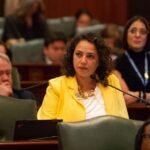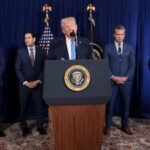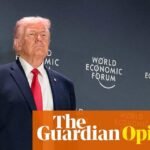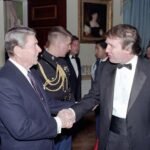President Donald Trump said early Wednesday that a trade deal with South Korea is “pretty much finalized” after months of talks.
“We reached a deal. We did a lot of different things. Great session,” Trump said after meeting South Korean President Lee Jae Myung for roughly 90 minutes on the sidelines of the Asia-Pacific Economic Cooperation Summit in Gyeongju, South Korea.
“We came to a conclusion on a lot of very different items,” Trump added.
Lee’s chief of staff, Kim Yong-beom, and other senior officials said at a briefing that Trump and Lee had resolved some of the key issues around the $350 billion investment pledge Seoul made as part of a preliminary July agreement to avoid higher U.S. tariffs. According to a report in the Seoul-based Yonhap News Agency, South Korea has committed to spending $200 billion in cash, paid in installments not exceeding $20 billion per year. The remaining $150 billion will be directed toward the U.S. shipbuilding industry, according to Lee’s aides, a top manufacturing priority for the Trump administration.
“As the investments will be made in line with business progress within an annual limit of $20 billion, they will remain within a range the Korean foreign exchange market can absorb, thereby minimizing any impact on the market,” Kim said.
In exchange, the U.S. will lower the tariffs on South Korean goods to 15 percent, Lee’s aides said. While most South Korean goods already face a 15 percent tariff, South Korean automobiles have been hit with a 25 percent duty, a higher rate than the country’s main automaking competitors, Japan and the European Union.
Pharmaceuticals, timber and lumber products will also receive “most-favored nation” tariff treatment, according to Yonhap. Airplane parts, generic drugs and natural resources not produced in the U.S. will be exempt from U.S. tariffs.
The White House did not immediately provide further details on the terms of the deal or return a request for comment. The countries have not released a joint statement, suggesting they could still be grappling with some details of the agreement.
Seoul’s $350 billion investment pledge has been a sticking point in the trade negotiations with the Trump administration. In particular, South Korean officials have balked at Trump’s demands to pony up an “upfront” payment to the U.S. government, which they warned would crater their economy. Instead, Lee has pushed for the $350 billion to come from a mix of direct investments, loans, loan guarantees and other financial safeguards.
Treasury Secretary Scott Bessent said Monday that the agreement was unlikely to be finalized before the Lee-Trump summit.
“Done? I think not quite,” Bessent told reporters. “The overall framework is done,” he said, adding that the countries are still “crossing the T’s [and] dotting the I’s.”










